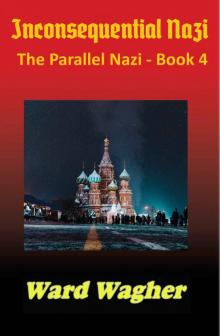- Home
- Ward Wagher
Accidental Nazi Page 6
Accidental Nazi Read online
Page 6
Schloss raised a hand in a throwing away motion. “I'm brainstorming here, Karl. Humor me.”
“Very well, Herr Partieleiter. We have to stop this insanity with the Jews. We need to figure out a way to drag the Englanders to the table. And I know you are frightened about the Americans.”
Schloss thought about his knowledge of history. Once the Americans entered the war, Germany's ultimate defeat was just a matter of time.
“Very well,” Schloss said. “Is there any immediate action we should take?”
Rainer shrugged. “Avoid antagonizing the Americans? Shoot everybody in the SS?”
Schloss snorted. “It may come to that. But if Germans start shooting at each other, we'll have a civil war and it won't end until the Englanders are marching through Berlin.”
“I don't think the Englanders could fight their way to Berlin,” Rainer said.
“I don't either, but we would be foolish to underestimate them.”
“What are your instructions, Herr Partieleiter?”
“Just keep on doing what you have been,” Schloss said. “If you see a specific threat, come to me.”
“Jawohl, Herr Partieleiter.”
“Let's get out of here.”
Schloss got out of his chair and buckled on his gun belt, and put on his jacket. It seemed to him that the Alter-Schloss and Rainer were close. Very close. So close that Schloss feared giving something away. And there was no predicting what would happen then.
CHAPTER SEVEN
June 15, 1941 9:00 AM
Schloss Residence, Charlottenburg, Berlin
“You were kind to invite Renate and Peter to stay here, Herr Schloss,” Frau Marsden said. “It would not be fitting to have your only living relative staying at a hotel.”
Schloss managed a wry grin. “I could hardly not ask her to, especially since she invited herself to stay here.”
“And the children were thrilled to see her,” she continued. “I know they do not say much to you about it, but they miss their mother badly. I believe Tante Rennie will be an encouragement.”
“I am actually delighted to have her here.”
“I have laid out a breakfast in the dining room for you, Herr Schloss.”
“Oh, very good, Frau Marsden.”
“Will you be spending the day at home?”
“No, unfortunately there is too much going on that requires my attention. However, I shall wait until after lunch.”
“Very well.”
Frau Marsden said nothing further, but the look on her face made it clear that Heinrich Schloss needed to spend time at home with his children. Schloss thought so too, but he was mainly concerned with easing into more knowledge of his family before spending any extended time at home – the fear of tripping over something gnawed at him.
Peter Schreiber sat at the dining room table and peeled a boiled egg. Schloss slipped into a chair and Frau Marsden quickly slid a cup and saucer in front of him and poured the coffee.
“I will prepare your toast now, Herr Schloss. I know you like it hot with the marmalade.”
He smiled up at her. The old lady was reading his mind. It was a bit disconcerting.
“That would be wonderful. Thank you.” He turned to his brother-in-law. “And how are you this morning, Peter?”
Schreiber looked up. “I must say it is much more restful to sleep in a bed instead of propped up in a seat in a Condor, Hennie.”
It appeared he had a nickname, Schloss thought. He smiled at the other man. “Not having experienced such, I will take your word for it. It doesn't sound pleasant.”
“But you have your own Condor, Hennie,” Schreiber said.
Schloss experienced that thrill of momentarily losing his balance. He had to watch everything he said.
“But I have never been able to sleep on board,” he said. “Of course, I didn't travel all the way from Argentina.”
“It got us here quickly, which is about all that can be said about it. Given the circumstances it is probably just as well.”
“What is it the Foreign Minister will have you doing?” Schloss asked.
“He has asked me to take over the management of the relationship with our fraternal allies in the East.”
It was clear that Schreiber had a dry wit. Schloss snorted. “Did Von Ribbentrop use those words?”
“Not directly, no. I received the impression that something is going on there. I don't suppose there is anything you can tell me?” He left the question hanging in the air.
Schloss looked down as he pulled an egg out of the basket and began cracking it. The conversations between him and his sister and her husband the night before had revealed a startling cynic in Schreiber. He not only had an open mind where the Nazis were concerned, but he freely shared this with Schloss.
“I am working very hard to ensure that there is nothing going on there, Peter. And that doesn't leave this room.”
Schreiber stared at Schloss. Then he nodded slowly. “Hitler must have been insane.”
Schloss took a bite of the egg and sipped his coffee. He needed allies. Was this the right place to look?
“The Foreign Minister knows I am married to your sister,” Schreiber continued. “He went out of his way to tell me this wasn't a problem for him.”
Decision time. “Peter, after I saw the Fuhrer's airplane crash in a ball of fire... and after I started thinking again, it occurred to me that we had just been handed an opportunity to save Germany. I don't know if it was blind fate, a cosmic accident, or if God decided to put his thumb on one side of the scales.”
“But you do not believe in a God,” Schreiber said.
Schloss held his hands palms up and shrugged. “You see my dilemma?”
“Mixed emotions, eh?”
“Like seeing my mother-in-law driving over a cliff in my new Mercedes?”
Schreiber laughed, the noise suddenly loud in the room. “That's very good. Where did you get it?”
“I heard it somewhere.” He felt it unwise to tell Peter he had heard the joke from an American Army sergeant in West Berlin, forty years in the future. “But let me tell you this,” he continued, “there were no mixed emotions at all. It was like the sun came out.”
“I thought much the same thing,” Schreiber said. He looked up as Frau Marsden walked in with Schoss's toast.
“Here you go, Herr Schloss. You should eat just a light breakfast. I am fixing your favorites for lunch.”
He smiled over at Schreiber. “Frau Marsden takes good care of us.”
The white haired woman snorted. “Herr Schloss is a challenge. I sometimes think he forgets the month and year. The children are no problem, of course.”
Schreiber laughed again. Schloss smiled, but also felt another chill wash over him. Frau Marsden, he had learned, was capable of some very enigmatic speech. Not only was she a skilled housekeeper and governess of the children, but she was adept at supplying information about his current situation. It always came at the right time. And it was usually enough to help him ease through the challenges of being from a different world / time / whatever. He wondered if it was intentional, and he wondered where she came from.
After she left the room Schreiber looked over at him. “So what do you want to do?”
Schloss leaned over and lowered his voice. “First of all I want to ensure the security of the Fatherland. That means we need to avoid war with the Russians and the Americans at all costs. Secondly, we have got to stop this madness with the Jews.”
“There are rumors in Buenos Aires,” Schreiber said. “But everyone discounts them as being far-fetched. Even the Anglophiles don't believe it. And, of course, I could say nothing.”
“Himmler has plans to build factories for the destruction of the Jews,” Schloss said simply. “People enter one side of the factory and ashes come out the other side. You have heard the term Judenfrei?”
“Gott in Himmel,” Schreiber whispered. “What madness has seized our people, Heinrich?”
“But, mein Gott, what a price!” Schreiber looked down at the table, then slid his plate away. “Forgive me, Hennie, but I have suddenly lost my appetite.”
“You understand what I am faced with?”
Schreiber looked at his brother-in-law. “What do you want me to do?”
“For right now, keep your eyes and ears open. If there is anything you think I need to know...”
He nodded. “I understand. I suspect Ribbentrop will pass me some of that information you need to know.”
“He well may do that. I suspect he may be one of the sane ones. However, Himmler has spies everywhere. Be very careful, Peter.”
“And you should be careful of Ribbentrop. I believe he will be on your side, but that is because it will be good for Ribbentrop. When he is around the anti-Semites in the office, he is an anti-Semite. He then drops the language when they are not around. He will tell you what he thinks you want to hear.”
“I have seen that,” Schloss said.
At that moment Renate swept into the room in a cloud of fabric, hair and good cheer. “Good morning husband and brother.”
She leaned over to kiss Schloss on the cheek, then kissed her husband. “Thank you for letting me sleep, my darling. I am still exhausted from the trip.”
Frau Marsden stepped into the room, which led Heinrich to suspect she listened to everything.
“Good morning, Frau Schreiber. Would you care for breakfast?”
“Only coffee and some fruit, if you have it.”
“I believe we can take care of that,” the older lady said.
She set the cup and saucer in front of Renate, and poured the coffee. “I shall have the fruit cup for you in a few moments.”
After she left the room, Renate looked over at her brother. “I do not know where you found her, Hennie, but she's wonderful. Do not let her leave.”
“Oh, I think she is here for the duration. I don't know how I could have managed otherwise.”
“It was very bad, wasn't it?” she asked.
The previous evening the Schreibers had carefully avoided discussing Hannelore. Schloss was just as glad, though not for the reasons they would have thought.
“To be honest, it has been like a bad dream that I can't quite wake up from. From one day to the next I have no idea what I am going to next. I suppose I have just muddled through.”
Schloss looked down at the table and assumed a sober mien. Renate studied him, then leaned over to hug him.
“And you were always the strong one. First Poppa and then Muttie died. You were such a tower of strength for me. And then we were in Argentina. I could not be here when Hannelore took ill. I am so sorry, Hennie. I really am.”
Schloss continued looking down at the table, and thought frantically. What should he say. Finally, he looked up at her.
“Listen, my sister, I appreciate what you say. It means more to me than you could ever imagine. But, I understood why you could not be here. I am just glad you have Peter at your side.”
“Oh, Hennie, you are just as immovable as ever. And you are right. Peter has been wonderful.”
Schloss looked over at Peter, who looked uncomfortable. Apparently more than one person in the room was uncomfortable. He cleared his throat.
“It still pains me to talk about this. Perhaps we might change the subject.”
“Oh, of course,” Renate said. “It was inconsiderate of me.”
“No, no. I'm glad we talked. But you will pardon me if we not dwell on it. Thinking about other things is nearly the only thing that gets me through the day.”
Frau Marsden stepped in with a fruit cup and spoon for Renate. “Here you go, Frau Schreiber.”
“Oh, thank you, Frau Marsden.”
The old lady carefully topped off the coffee cups and left the room again.
“I wonder if we might take the children to the park today?” Renate asked.
“I really must attend to the office after lunch,” Schloss said. “I'm sorry.”
“When have you last had a day off?”
“I really don't remember.”
“Take a day, Hennie,” she said. “You need it. The children need it.” She looked over at her husband. “Tell him, Peter.”
Peter held his hands up. “I'm staying out of this one. Sorry.”
She slapped him on the shoulder. “You are no help. You are supposed to convince your brother-in-law of the need to relax.”
He grinned at Schloss. “You need to relax.”
Schloss grinned back. “Is she like this all the time?”
“Mostly. But remember, you warned me about her before the wedding. You told me to run.”
“So I did,” Schloss said. “It seems nobody wants to pay attention to my advice. You didn't.”
“At the time I thought I knew better.”
“Quit!” Renate said. “Now I remember why we went to Argentina. When you two get together, you are impossible.”
Frau Marsden chose that moment to march into the room again. “Herr Schloss, I will prepare a lunch basket for you to take to the park. You have not seen your sister in three years. I think everyone will understand that you wanted to spend time with her, and with the children of course.”
“Okay, okay. I surrender,” Schloss said. “I'm pulling my colors down. Just like the French did.”
“And you are not very funny, Herr Schloss,” Frau Marsden said.
“Keep telling him that,” Renate said. “He doesn't believe me.”
Schloss stood up. “Perhaps I should go change into something more appropriate to a stroll in the park.”
“He runs and hides,” Renate said with a smile.
“I believe that is called a strategic retreat,” Peter said.
“You keep out of this,” his wife said, pointing her finger at him.
Heinrich Schloss smiled to himself as he mounted the stairs to his bedroom. If he was to be trapped in this universe, wherever it was, the Schreibers were a welcome counterpoint to the madmen at the Reich Chancellery. They were just pleasant people. Looking at the reflection through these people, perhaps the Alter-Schloss was not the monster he thought.
CHAPTER EIGHT
June 18, 1941 2:00 PM
Reich Chancellery, Berlin
“NO!”
Everyone around the table stared at Schloss.
“Excuse me, Herr Partieleiter?” Himmler asked with a voice just slightly warmer than liquid helium.
“I said no,” Schloss repeated. “We canceled Barbarossa for a very good reason, and I do not see that those reasons have changed.”
“I have to wonder whether you have some other purposes in mind,” Himmler continued.
“And what purposes do you think I have in mind, Herr Reichsprotektor?”
Schloss’s mind had shifted back into high gear and he was frantically trying to think several moves ahead. He was convinced, however, that the best strategy for dealing with Heinrich Himmler was to push back just as hard, and to be just as ruthless.
“It seems to me that you are actively working to forestall every point of the Fuhrer’s plan for Germany. The Fuhrer was planning far ahead. Are you?”
Himmler had no idea how far ahead Schloss was planning. “And when the Soviets are knocking at the door of Berlin, where will you be? We don’t have the benefit of the Fuhrer’s leadership. I plan to be alive fifty years from now, and I plan to live in a Germany that no one will dare touch.”
The others in the room seemed content to let the two of them argue it out. Probably wise on their part, Schloss reflected. Everyone knew Himmler was deadly dangerous. But Schloss’s reputation aided him as well.
“Are you sure you are for Germany and not just for yourself, Herr Schloss?”
“Let’s be honest here, Mein Herren,” Schloss said. “Everyone sitt
ing in this room is serving themselves as much as they are the Reich. And any of you who says otherwise is a liar.”
Perhaps the term liar would be an understatement as this group lied, schemed and murdered to get to the top and would not think twice about bringing the whole nation down around them in the end.
“I simply do not trust you,” Himmler said. “I think we should go ahead with Barbarossa. Our forces are in position. We have a magnificent opportunity.”
Schloss hoped the forces were not in position. He and Hess had quietly begun pulling them back from the frontier. He remembered reading somewhere that when an army postponed an offensive, the operation was effectively dead. He was doing everything possible to make sure that was true in this instance. But he really hoped Himmler would not find out what he had been doing. There was no sense asking for more trouble.
“And what would happen if we were to commence Barbarossa?” Schloss asked. “For six months we would rampage across Russia. Stalin will fall back and fall back and we never will quite destroy his armies. And then the Russian winter will chew us up. Have you read the histories of Napoleon’s march on Moscow? And Napoleon was a brilliant general.”
“Surely Napoleon was not as competent as our general staff,” Himmler said.
“He wasn’t?” Schloss asked. “Who stood between Napoleon and Moscow a century ago? The Prussians. Napoleon went through Germany like scheiss through a goose. And what happened to him in Russia? The same thing that will happen to us.”
“I believe you are too pessimistic. What do you think, Herr Reichsmarshall?”
Goering looked as though he really did not want to join this argument. He looked around the table carefully, trying to gauge the mood.
“Come on, Hermann,” Himmler snapped, “I asked you what you thought.”
Goering gave a deep sigh. “The Partieleiter makes some good points.”
“So you think we should cancel Barbarossa?”
“I did not say that. I simply said Herr Schloss makes some good points. The country is still in turmoil after last week. I believe we would be wise to wait.”
“Since no one else is speaking out, may I assume everyone is in favor of this delay?”

 The Mountains of Montora (The Chronicles of Montora Book 1)
The Mountains of Montora (The Chronicles of Montora Book 1) Nazi Magician: Inventor
Nazi Magician: Inventor The Last Paladin
The Last Paladin Inconsequential Nazi
Inconsequential Nazi Impossible Nazi
Impossible Nazi The Snows of Montora (The Chronicles of Montora Book 3)
The Snows of Montora (The Chronicles of Montora Book 3) The Margrave of Montora (The Chronicles of Montora Book 2)
The Margrave of Montora (The Chronicles of Montora Book 2) Gravity Rising (The Parallel Multiverse Book 2)
Gravity Rising (The Parallel Multiverse Book 2) ruBracks, Nazis, the Death of the Universe & Everything (The Parallel-Multiverse Book 1)
ruBracks, Nazis, the Death of the Universe & Everything (The Parallel-Multiverse Book 1) Improbable Nazi (Parallel Nazi Book 2)
Improbable Nazi (Parallel Nazi Book 2) Accidental Nazi
Accidental Nazi Improbable Nazi
Improbable Nazi